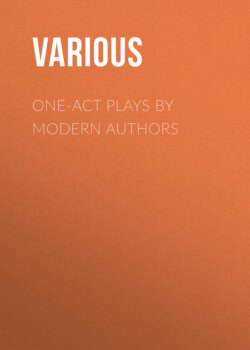Читать книгу One-Act Plays by Modern Authors - Various - Страница 15
На сайте Литреса книга снята с продажи.
BEAUTY AND THE JACOBIN[23] By BOOTH TARKINGTON
ОглавлениеTable of Contents
Since the days of Edward Eggleston, Indiana has been accumulating literary traditions until at the present time it rivals New England in the variety of its literary associations. Newton Booth Tarkington, born in Indianapolis in 1869, and continuing to make his home there still in the old family house on North Pennsylvania Street, is one of the most distinguished of the Hoosier writers. As a lad of eleven he began his friendship with James Whitcomb Riley, then a neighbor. "He acknowledges (shaking his head in reflection at the depth of it) that the spirit of Riley has exercised over him a strong, if often unconsciously felt, influence all his life." The delicious stories of Penrod and of the William Sylvanus Baxter of Seventeen that Booth Tarkington has told for the unalloyed delight of old and young are said to reproduce quite accurately the author's recollection of his own boyhood pranks and associations in the Middle-Western city of his birth. Tarkington went first to Phillips Exeter Academy and later to Purdue University at Lafayette, Indiana, before he became a member of the class of '93 at Princeton. His popularity and his good fellowship are still cherished memories on the campus.
It seems that he was infallibly associated in the undergraduate mind with the singing of Danny Deever; so much so, that whenever he appeared on the steps at Nassau Hall there would be an immediate demand for his speciality, a demand that often caused him to retire as inconspicuously as possible from the crowd. These old days are commemorated in the following verses, a copy of which, framed, hangs on the walls of the Princeton Club in New York.
| RONDEL |
| "The same old Tark—just watch him shy Like hunted thing, and hide, if let, Away behind his cigarette, When 'Danny Deever' is the cry. |
| Keep up the call and by and by We'll make him sing, and find he's yet The same old Tark. |
| No 'Author Leonid' we spy In him, no cultured ladies' pet: He just drops in, and so we get The good old song, and gently guy The same old Tark—just watch him shy!" |
No biography of Booth Tarkington, no matter how brief, should omit to mention that he was elected to the Indiana State Legislature and sat for a time in that body, where he accumulated, no doubt, some data on the subject of Indiana politics that he may afterwards have put to literary use.
He has found the subject for most of his novels and plays[24] in contemporary American life, which he treats unsentimentally, spiritedly, and vigorously. Beauty and the Jacobin, like his famous and fascinating tale, Monsieur Beaucaire, is exceptional among his works in deserting the modern American scene for an Eighteenth Century situation. The story and the play are likely, for this reason, to be compared. The tone of Monsieur Beaucaire is more urbane, more whimsical, more romantic than the mood of Beauty and the Jacobin which "breaks with the pretty, pretty kind of thing. There is a new quality in the texture of the writing. … The plot here springs directly from character, and the action of the piece is inevitable. Beauty and the Jacobin gives evidence of being the first conscious and determined, as it is the first consistent, effort of the author to leave the surface and work from the inside of his characters out. … The whole of the little drama is scintillant with wit, delicate and at times brilliant and somewhat Shavian, which flashes out poignantly against the sombreness of its background."[25]
Beauty and the Jacobin was published in 1912 and has had at least one performance on the professional stage. On November 12, 1912, it was played by members of the company then acting in Fanny's First Play, at a matinée at the Comedy Theatre, in New York. It has always been a favorite with amateurs and quite recently was performed in St. Louis by one of the dramatic clubs of that city.
